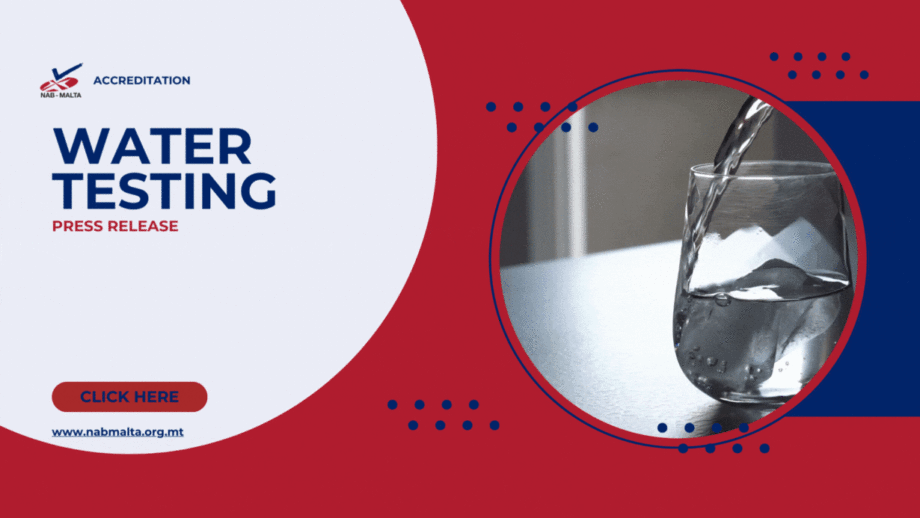- The Water Services Laboratory is one of the very first accredited laboratories in Malta.
- Through an interview with the Technical and Quality Co-ordinating Managers Mr. David Spiteri and Mrs. Diandra Briffa the below information and advice was highlighted.
Safe drinking water is a basic need to ensure a healthy and nutritious life. Our bodies are in fact constituted of around 60% water. The European Union values the importance of water which is why it imposes several Regulations, Directives, and Guidance documents on the availability, safety, and quality of drinking water. Such guidance takes into consideration all life stages of individuals in the society including the young, old, pregnant, and immuno-comprised. Such strict guidance also factors in a lifetime of consumption. One needs to drink water for a lifetime, so the accumulation of chemicals is taken into account, when drafting and adopting such regulations. This further highlights the important role that water providers and water testing laboratories have in our society.
In Malta, the Water Services Corporation (WSC) plays a vital role in providing potable water and managing waste-water treatment to the whole population of Malta. To ensure the safety and quality of the water supply, WSC invested in a fully equipped testing laboratory which is also subject to external checks by NAB-Malta. Such check or verification by the NAB-MALTA is part of the process also known as accreditation. Accreditation in accordance to ISO/IEC 17025 is the highest level of objective quality check that is available on the market and this is regulated by a European body known as ‘European Accreditation’.
Unsafe water is known to cause water-borne diseases which is caused through contamination of bacteria and viruses such as Escherichia coli (E. coli) and Legionella Pneumophilia. Such diseases can be life-threatening, especially to the most vulnerable individuals within our community. Toxicity of water with for example Nitrates, Arsenic, and other heavy metals leaching out in water is another form of poisoning that can accumulate over a period of time. Furthermore, untreated water can also contain other water parasites such as worms, and larvae.
Water analysis
WSC recognises the importance of accurate and reliable water analysis, which is why most tests are carried out in-house, to ensure efficient results. WSC built one laboratory which is divided into multiple rooms over 800 SQM. Each room specialises on different kinds of water and tests. The equipment within these laboratories is cutting edge and investments are ongoingly carried out to ensure that the latest testing requirements are being met.
WSC Laboratory and Accreditation
WSC was the first laboratory to become accredited on the Maltese islands. Initially seeking accreditation for specific analytical methods and sampling processes, WSC laboratory gradually expanded the scope of accreditation to include additional methods and processes each year. This step-by-step approach allowed the laboratory to ensure compliance with ISO/IEC 17025 whilst continuously improving its operations. The annual assessment cycle of NAB-Malta accreditation has been instrumental in ensuring continual improvement within the laboratory.
An effective techno-managerial approach
Accreditation helps the laboratory to attain a techno-managerial perspective as the technical methods are witness audited. This mainly includes the tools of Proficiency testing and participation in inter-laboratory comparisons (ILC). One has to also look at the managerial aspects of managing resources, setting objectives and targets, and finally ensuring that there is laboratory continuity. The end goal is to provide a good quality and accurate test to both our customers and consumers each and every time. And in this case, WSC releases its quality-tested water to the people inhabiting the Maltese islands.
The laboratory takes a proactive approach and makes use of Laboratory/Quality Management software, to ensure sample traceability and streamline the laboratory processes. Reducing laboratory complexity, and maximising laboratory resources.
Further reading:
- Guidelines for drinking-water quality: Fourth edition incorporating the first and second addenda WHO TEAM Environment, Climate Change and Health, Water, Sanitation, Hygiene and Health, ISBN: 978-92-4-004506-4, https://www.who.int/publications/i/item/9789240045064
- Directive (EU) 2020/2184 of the European Parliament and of the Council of 16 December 2020 on the quality of water intended for human consumption, https://eur-lex.europa.eu/eli/dir/2020/2184/oj
- Water Services Corporation, https://www.wsc.com.mt/facilities/laboratory/

